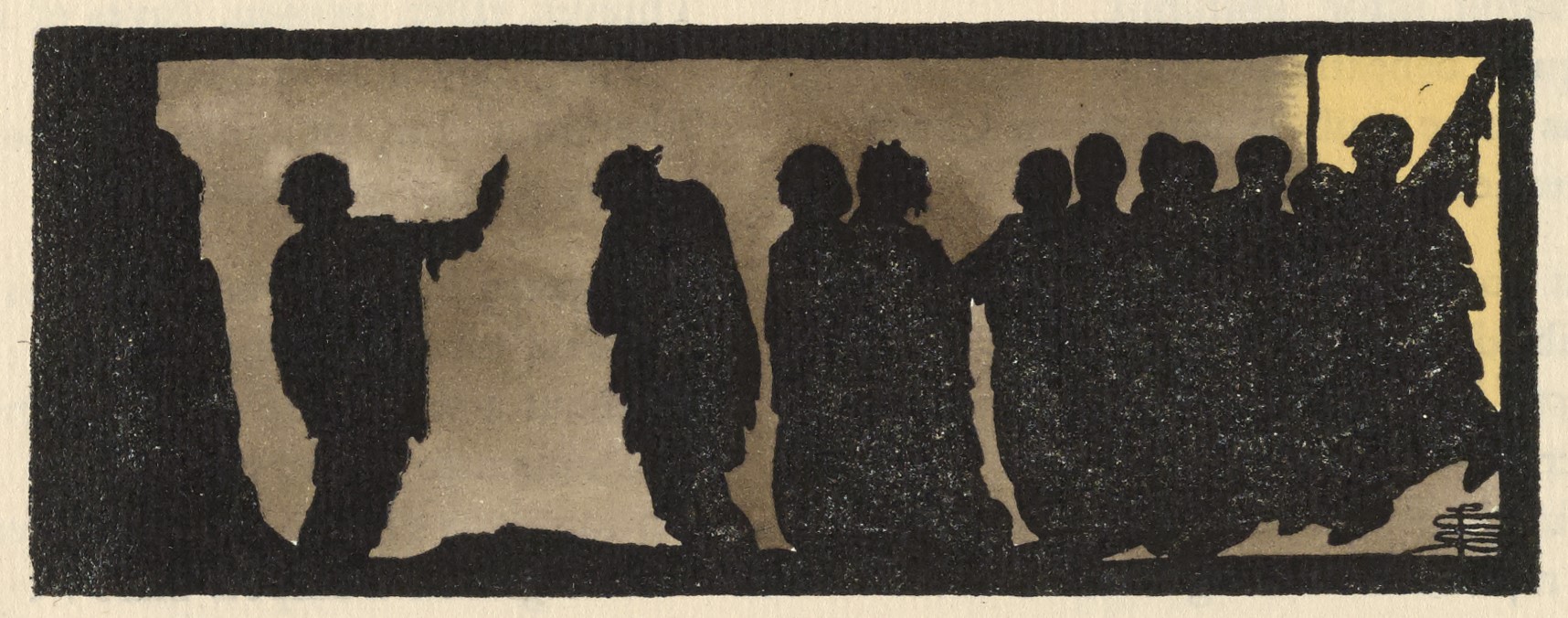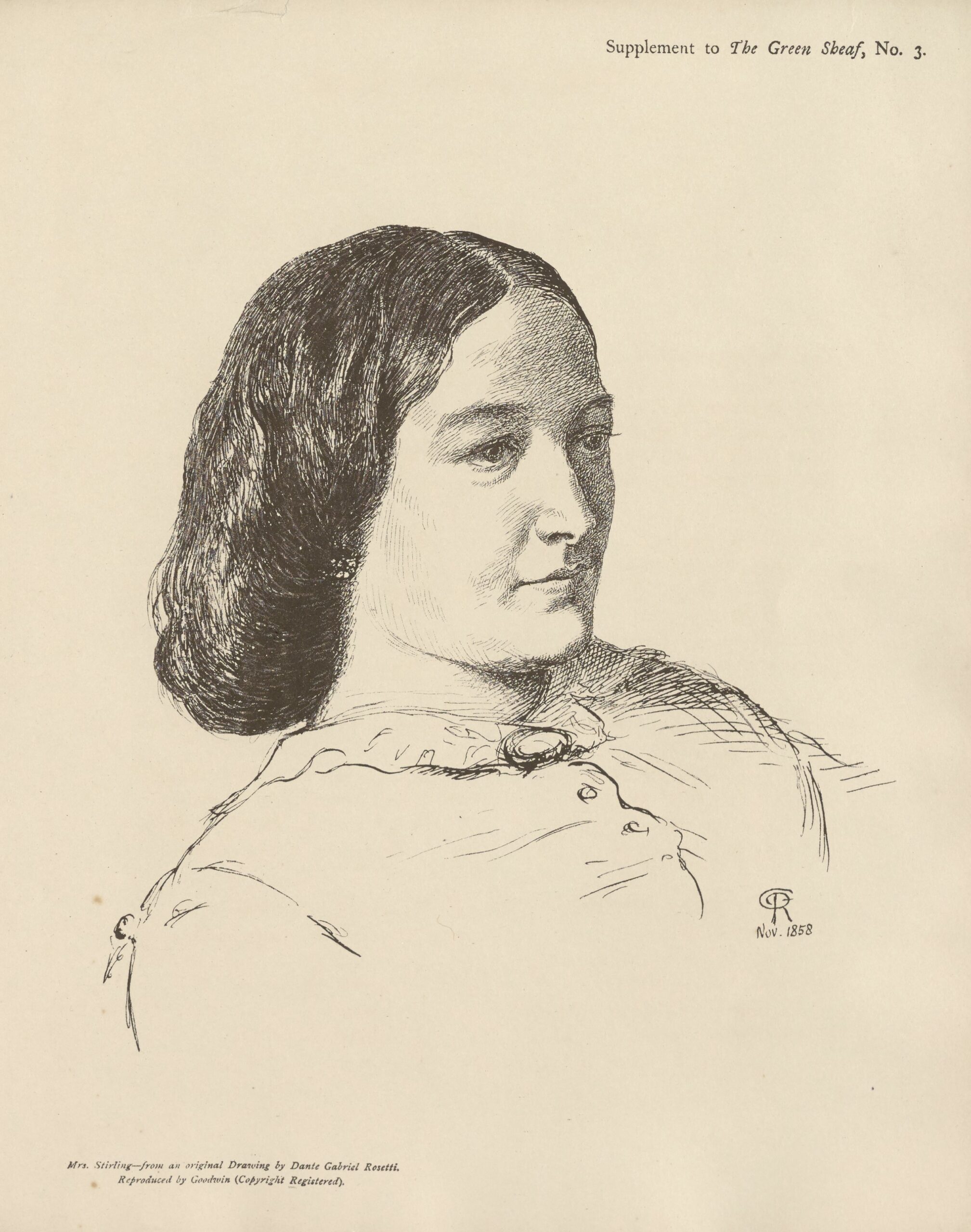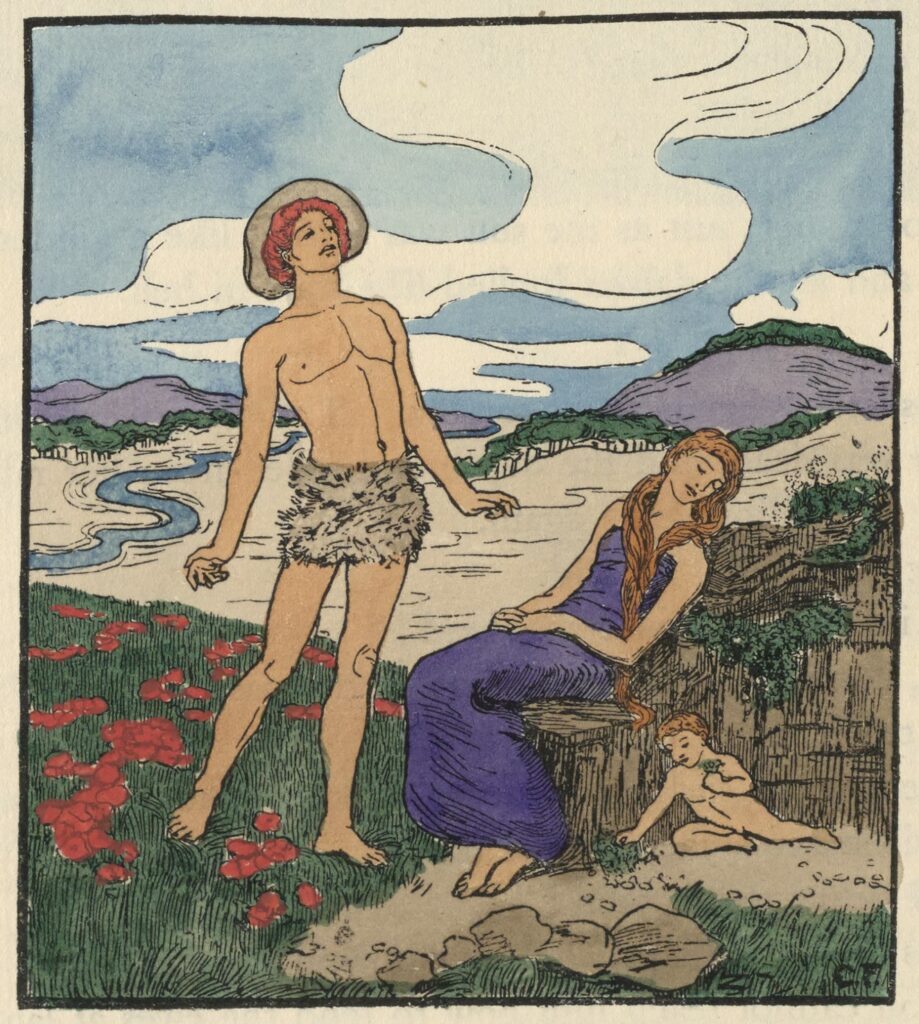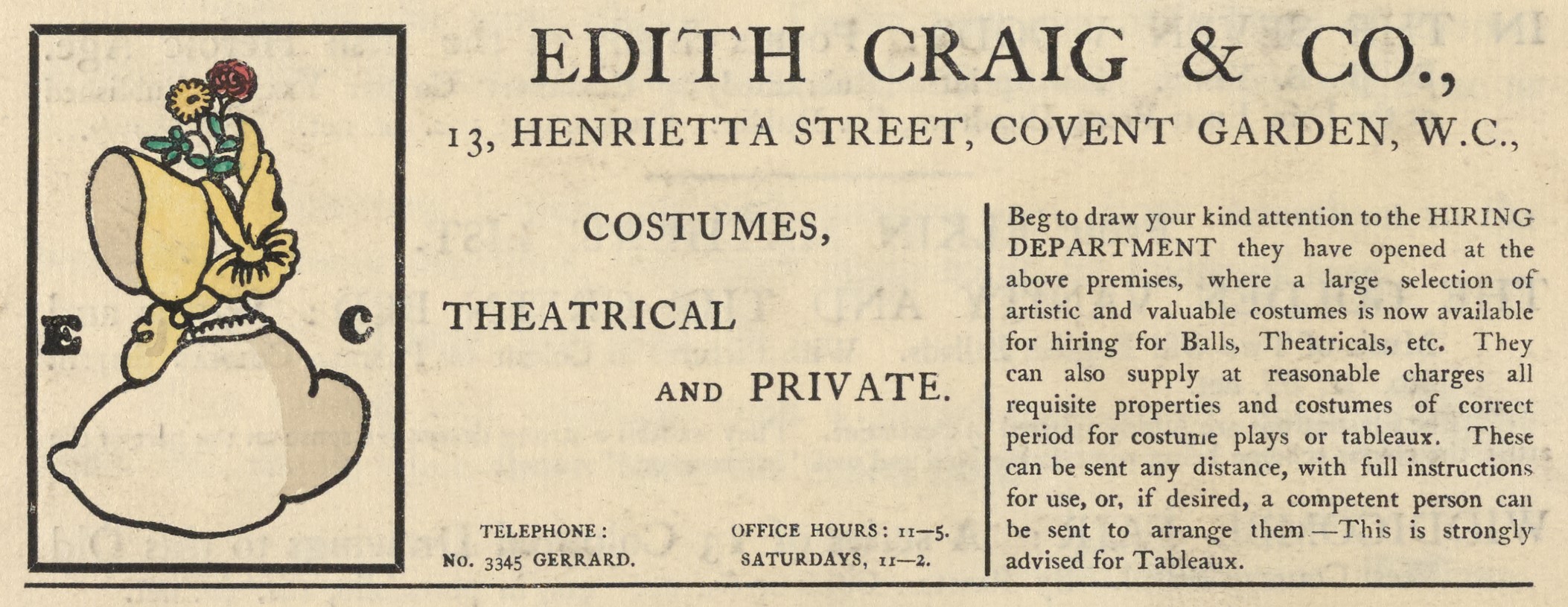TABLE OF CONTENTS
No. 3
Front Cover, by Pamela Colman Smith [i]
A Masque: The Harvest Home, by Edward Gordon Craig 2-3
Illustration by Edward Gordon Craig 2
Page decoration by Edward Gordon Craig 2
The Lament of the Dead Knight, by Alix Egerton 4
Illustration by Cecil French 4
Eventide, by Ernest Radford 5
Illustration by Pamela Colman Smith 5
Spanish Ladies, Musical score arranged by Martin Shaw 6
Illustration by Pamela Colman Smith 6
Lyrics adapted by John Masefield 7
Page decoration by Pamela Colman Smith 7
Reconcilement, by A.E. [George Russell] 8
Donald Dubh, by Lina Marston 8
Page decoration by Pamela Colman Smith 8
Audax in Recto, by W.T. Horton 9
A Ballad of a Night Refuge, poem by Christopher St. John 10-12
Illustration by Pamela Colman Smith 12
Illustrative Supplement. Mrs. Stirling, by Dante Gabriel Rossetti np
A Pagan Rhyme, by Herbert Shaw 12
Cornelion and Amethyst, by E. Harcourt Williams 13-14
Illustration by Cecil French 14
Advertisements 15-16
Advertisement for Edith Craig & Co., illustrated by Pamela Colman Smith 16
The Ceremony of an English Harvest Home is thus
described by Hentzner, who travelled through England
towards the close of the 16th century, and published
his itinerarium in 1598. “As we were returning to
our Inn” (at Windsor) “we happened to meet some country people
celebrating their harvest home: their last load of corn they crown
with flowers, having besides an image richly dressed, by which they would
perhaps signify Ceres; this they keep moving about, while men and
women, men and maid servants, riding through the streets in the cart,
shout as loud as they can till they arrive at the barn.”
In the present entertainment the above description is followed with
some exactness, though the whole partakes of the character of a Masque.
The music is nearly all taken from the most beautiful and in some cases
unfamiliar folk music. PURCELL has been drawn upon for a charming
country dance, and for the kissing duet.
First we have a procession of harvesters clad in faultlessly correct
costumes, who sing their way through the village to the barn with a
harvest song. After the ceremony has taken place, they give themselves
up to sport and play. Characteristic songs are sung by the various
villagers, and the utmost good humour and merriment prevails. For the
miller leaves his home by Dee side to sing and enjoy himself, and is not
the poacher of Lincoln here telling of “his delight on a starry night?”
Then there are the Morris dancers capering about with bells on their legs,
and the Hobby Horses with an exact presentment of the dance which took
the town and country side by storm in the time of the Merry Monarch,
—the Swinging Songs—the Kissing Duets—the Children and their little
Maypole—and so on, till you, and the dancers, and singers are tired.
The day’s festivities end by a dance in which all join in a rollicking
tune called “The King’s Jig,” the strains of which are heard for away in
the distance as the merry makers retire to their homes. The performers
number from 30 to 40, and the time taken is about three quarters of an
hour, or longer if desired.
THE LAMENT OF THE DEAD KNIGHT.
I hear my dear Love
Crying in the North,
While all the ice-floes lay ’twixt me and her,
And frozen by her tears I could not stir
Nor reach my dear Love
Crying in the North.
I hear my dear Love
Crying in the East,
Around her lay long leagues of desert land,
And I lay buried underneath the sand,
And could not touch her
Crying in the East.
I heard my dear Love
Crying in the South,
The flowers grew so thick about her feet,
Blinding me with their perfume sickly sweet.
I could not find her
Crying in the South.
I hear my dear Love
Crying in the West,
Where the green grass is waving over me,
But, Oh, her dear, dear face I cannot see,
Nor kiss my dear Love
Crying in the West.
Alix Egerton.
SPANISH LADIES.
Farewell and adieu to you fine Spanish Ladies—
Farewell and adieu all you Ladies of Spain—
For we’ve received orders to sail for Old England
And perhaps we shall never more see you again.
Chorus—We’ll rant and we’ll roar like true British Sailors,
We’ll range and we’ll roam over all the salt seas,
Until we strike soundings in the Channel of Old England—
From Ushant to Scilly ’tis thirty-five leagues.
We hove our ship to when the wind was sou’west boys,
We hove our ship to for to strike soundings clear,
Then we filled our main-tops’l and bore right away boys,
And right up the Channel our course we did steer.
Chorus—We’ll rant and we’ll roar—etc.
The first land we made it is known as the Deadman,
Next Ram Head near Plymouth, Start, Portland and Wight;
We sailed past Beachy, past Fairly and Dungeness,
And then bore away for the South Foreland Light.
Chorus—We’ll rant and we’ll roar—etc.
Then the signal was made for the grand fleet to anchor
All all in the Downs that night for to meet,
So stand by your stoppers, see clear your shank-painters.
Haul all your clew-garnets, stick out tacks and sheets.
Chorus—We’ll rant and we’ll roar—etc.
Now let every man toss off a full bumper,
Now let every man toss off a full bowl,
For we will be jolly and drown melancholy
In a health to each jovial and true-hearted soul.
Chorus—We’ll rant and we’ll roar—etc. 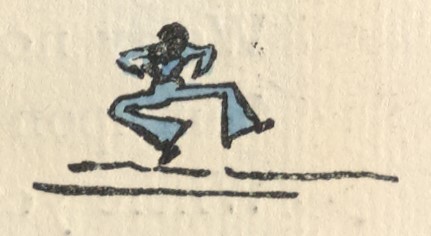
Words and Music given to John Masefield by Wally Blair , A.B.
RECONCILEMENT.
I begin through the grass once again to be bound to the Lord,
I can see, through a face that has faded, the face full of rest,
Of the earth, of the mother, my heart with her heart in accord.
As I lie ’mid the cool green tresses that mantle her breast
I begin through the grass once again to be bound to the Lord.
By the hand of a child I am led to the throne of the King;
For a touch that now fevers me not is forgotten and far,
And His infinite sceptred hands that sway us can bring
Me in dreams from the laugh of a child to the song of a star.
On the laugh of a child I am borne to the joy of the King.
A. E.
DONALD DUBH.
“Donald Dubh! Donald Dubh!” Ah! for pity’s sake
Cry no more upon his name, lest my heart should break,
Listen!—“Donald! Donald Dubh!”—how the curlews call,
Winging low upon the moor where the shadows fall.
“Donald Dubh! Donald Dubh!”—Cold and stark his clay,
Cold the earth lies on his breast, where my kisses lay.
I have sought you, Donald Dubh, over hill and plain,
And I find you here, at last, in the wind and rain.
Donald Dubh, Donald Dubh, I have wandered wide,
Weary now I lay me down at your lone grave side.
Out upon the windy moor, by the sobbing sea,
Where you’re sleeping, Donald Dubh, is there room for me?
Lina Marston.
A BALLAD OF A NIGHT REFUGE.
(To MAXIM GORKY.)
Night after night, below the street,
We sank into the dark;
A company of wretched souls,
Bearing one fearful mark—
The sign of the ashes and the dust
That choke the heavenly spark.
And those of us who rose at morn,
And crept into the light,
Were dazed and angered by the world—
Better the impure night,
When clouds of smoke and brandy fumes
Deadened our anguished sight;
And through the gloom distorted shapes
Wrangled and cursed and cried,
Or, with gross jest and devilish sneer,
Called on the Christ who died;
While all the time their wretched state
Did their poor vice deride.
Creatures that once were men, we loathed
To look upon the sun—
The sun’s no friend to sores and dirt;
Our rags of gray and dun
Took on some grace in that foul place
Where night and day are one . . .
Those at the bottom have their pride,
Those at the bottom know
That nimble air and sunshine fair
Abhor the sons of woe.
And those who from the darkness come
Must back to darkness go.
Down to our sordid deeps one night
A tramp, a stranger came;
He slipped upon the rotting steps—
He happened to be lame—
And fell headlong—we yelled with mirth;
A cripple is fair game!
And he laughed too, but now the sound
Was that you hear above,
When lovers dance to violins,
And laugh because they love.
In dull surprise, with drink-dimmed eyes
We stared—not one could move.
He seemed as wretched as we all,
The bottom his right place,
Yet he was gay as June and Day,
Like the blue sky his face;
His glance was clear as one who sees
Horizons far in space.
The Green Sheaf
He said that he had tramped the roads,
The roads that have no end,
Until his feet were past the power
Of God or man to mend;
Nor could he find, he said, a king,
With a prancing horse to lend!
Like rain upon our sullen souls
His gentle story fell—
Thief, baron, actor, anarchist
Sat quiet beneath his spell—
Quiet as those souls in pain when Christ
Descended into hell.
Nor did you hear or flout or jeer,
Or ribald laugh upraised;
“What you believe, that alone is,”
He cried—we sat amazed,
While he described the righteous land,
And rapt before him gazed.
“’Tis far from men who sow and reap.
This dear, this righteous land;
It is not marked on any map,
No ship has touched its strand:
Yet can I show its beauty now,
Its wealth ye may command.
“We do not dream—a heavenly stream,
Where drunkards drink, and straight
Their wasted years are given back,
Once more they’re at the gate
Of hope, of fame—once more their name
Burns on the angels’ slate.
“A robe of white, a seamless robe
Worn once, makes bodies fair
That here were spoiled by dirt and lust—
The body’s leprous snare:
As light as ghosts, as sweet as flowers,
They walk in beauty there.
“In righteous land there are no laws,
No prisons, and no gold;
No kings—our crowns are broken hearts—
Good is not bought and sold;
But men all learn to love and give,
Then all their life is told.”
Pale as the moon-white hosts of death,
They rose up from the ground—
Thieves, fallen women, slaves of drink,
They moved as in a swound,
They moved as though to hidden flutes—
Slowly they gathered round.
And gazed in his enraptured eyes;
Then, turning, left him there;
Without a word, the ghastly herd
Climbed to the upper air.
On ramparts dim of highest heaven,
The golden trumpets blare . . .
The Baron smiled his mystic smile,
Held up his thin white hand:
“With lie divine you catch the weak
They seek your Righteous Land,
And find Asylums, Prisons, Homes,
Rescue—best Christian brand.
“Feed them with lies, for lies bring dreams,
And flaming reveries;
But so you may not feed the strong.
Who read with bitter eyes
The brutal truth, and lose the wings
That bear to Paradise.”
. . . And now was hurled from the outer world
A sudden blast of noise,
Four men in black, all spick and span,
With lamps and steely toys,
Came over the rim of the cellar dim—
. . A savage “All right, boys”—
The Green Sheaf
A sickening clap of an iron trap,
The jingling of a chain,
That lame, frail man is prisoned fast
By four men, strong and sane.
Four men must bind his delicate hands,
And give his body pain.
In his jacket strait, he is dragged away—
He draws a shuddering breath—
Like worlds on fire his lonely eyes—
As with gasping sigh, he saith:—
“The weak have faith, the weak have dreams . . .
The strong have only death!”
Petersburg, 19—
Christopher St. John.
A PAGAN RHYME.
The big men of the city
They walk her streets with ease,
And rule her men like gentlemen
Careless whether they please—
And if they sin ’tis licensed sin
By their own law allowed—
Give me to be an outsider
One of the crowd.
The ladies of the city
They drive adown her ways—
(Armed scornful ’gainst all glances
And heedless of men’s praise—
Snow white for show to the city)—
Cry not their loves aloud—
Give me to love an outsider
One of the crowd.
These princes of society.
The narrow ring inside—
Without there beats the fighting world
A cramped but happy tide—
Bound all their little laws to keep,
Of high position proud—
Give me for friend an outsider
One of the crowd.
Give me to live beyond the pale
Not covetous of wealth—
Give me to keep the laws of life
And a strong law for myself—
Give me to love the hearts of men
And scorn the outward dress—
Give me to be an outsider
Nothing less.
Herbert Shaw.
CORNELION AND AMETHYST.
There was once a shepherd youth called Cornelion. He was wont to
tend his flock and pipe all day upon an oaten reed in a field bedecked
with poppies and white daisies. His loins were clad in a rugged sheep
skin, and his bronzed limbs shone red-brown in the sunset. A wide
brimmed hat was on his bright red towzled hair, shading his features—
transparent in their beauty—and into leathern sandals were thrust his
naked feet.
One day a maiden came among the poppies. She was very fair to
see, her eyes were like two violets in Spring, and Cornelion named her
Amethyst, because the garment girded round her body was deep in colour
like that precious stone.
Now it came about that Cornelion took Amethyst in his arms, so that
his brown limbs mingled with her fair flesh, and her hair tumbled all about
his face like a bounteous aureole. Then did Cornelion kiss Amethyst,
because he loved her, just as the sun was setting like a golden orange in a
bowl of blue and all the daisies looked like stars in hell.
. . . . . . . . . .
Amethyst hung her head in sorrow. The lustre had gone out of her
eyes, her hair was dead, and the depth had faded from her raiment.
One day Cornelion came again.
“I want my child,” he said.
“No child of thine, false shepherd!”
“Come, come, my Amethyst, forget the past.”
“Then teach me to forget myself.”
“I do repent me and am come to make amends. Let me have the
child and I will make a shepherd of him.”
“Must I suffer more, then?”
“For his sake—perhaps. How can you do for him so well as I do
purpose? You cannot teach him how to tend the ewes at lambing time.”
Amethyst raised her tearful face, “I can if sorrow is the way.”
“My perfect jewel, I too can sorrow teach.”
13The Green Sheaf
“Then let the child decide. Come here, my little Born-of-sorrow.
Wouldst rather go and be a shepherd with Cornelion or stay with me as
heretofore?”
Born-of-sorrow looked up with anxious eyes from Amethyst to the
well-built brawny shepherd, then back again to all he knew of love.
At last: “I want you both!”
Then nymph and shepherd with a joyful throb took each a chubby
hand and played once more upon the oaten pipe.
E. Harcourt Williams.
IN THE SEVEN WOODS: Poems chiefly of the Irish Heroic Age.
By W. B. Yeats. Hand-printed (Rubricated) by Elizabeth Corbet Yeats. Published
at the Dún Emer Press, Dundrum, Co. Dublin. Crown 8vo, 10s. 6d. net. [Shortly.
From ELKIN MATHEWS’ LIST.
THE GOLDEN VANITY AND THE GREEN BED: Words and
Music of Two Old English Ballads. With Pictures in Colour by Pamela Colman Smith.
4to, 7s. 6d. net.
“The illustrations are highly spirited in treatment. They exhibit a strong decorative
sense on the part of the
artist, the colour scheme being remarkably bold and well ‘harmonised.’”—Studio.
WIDDICOMBE FAIR: A series of 13 Coloured Drawings to this Old
West Country Ballad. By Pamela Colman Smith. 4to, in portofolio, 10s. 6d. net.
A BROAD SHEET—For the Year 1902: With Pictures by Pamela
Colman Smith and Jack B. Yeats. Hand-coloured. Twelve numbers, post free,
12s. 6d. net. A portfolio may be had at 2s. net.
Fourth Edition Now Ready.
THE WIND AMONG THE REEDS. By W. B. Yeats. Crown
8vo, 3s. 6d. net.
POEMS. By the late Lionel Johnson. With a title design and colophon
by H. P. Horne. Printed at the Chiswick Press, on hand-made paper. Crown 8vo.
5s. net.
“Full of delicate fancy, and display much lyrical grace and felicity.”—Times.
“An air of solidity, combined with something also of severity, is the first impression
one receives from these
pages. . . . The poems are more massive than most lyrics are; they aim at dignity
and attain it. This is, we
believe, the first book of verse that Mr. Johnson has published; and we would say,
on a first reading, that for a first
book it was remarkably mature. And so it is, in its accomplishment, its reserve of
strength, its unfaltering style. . . .
Whatever form his writing takes, it will be the expression of a rich mind, and a rare
talent.”—Saturday Review.
THE CANON: An Exposition of the Pagan Mystery perpetuated in the
Cabala as the Rule of all the Arts. With a Preface by R. B. Cunninghame Graham.
Finely printed at the Chiswick Press. Demy 8vo. Over 400 pp., with numerous Illustra-
tions. 12s. net.
“The modern mystic is commonly a poor fool on the verge of entire intellectual disorganization.
But the
anonymous author of ‘The Canon’ is not of that generation; his work has the unmistakable
quality of power.
He is three or twelve hundred years out of his generation, which is after all his
misfortune rather than his fault.
Amidst the Rosicrucians or the Gnostics he would have been a great master. The chapters
on the Cabala, The
Ark, and The Temples, for instance, are really admirable expositions of a method of
inquiry that I had thought
vanished from the earth. . . . A thoughtful and laborious contribution to theological
study.”—Mr. H. G. Wells in
The Saturday Review.
“The very best books are not written to please the world but to please the writers,
and so the anonymous
writer of ‘The Canon’ has doubtless already had his reward.”—Outlook.
“This beautiful book . . . . with all its curious learning is beyond the scope of
all but the most mystical
and credulous reader.”—Manchester Guardian.
Published by ELKIN MATHEWS, Vigo Street,
Nigh the Albany, London.
The Green Sheaf
LACE MAKING.
POINT-LACE made to order and Lessons given by Miss Baillie,
I, Prince’s Terrace, Bayswater, W. Designs by Pamela Colman Smith.
For particulars apply to above address.
⎯
The next number of The Green Sheaf will contain—
Poems and short stories by Alix Egerton, Lucilla, A.E., and
others.
Drawings by Cecil French, Pamela Colman Smith, and Gordon
Craig.
A Supplement will be given with No. 4.
There will be thirteen Numbers of The Green Sheaf in a year,
printed on antique paper and hand-coloured, and the Subscription is
Thirteen shillings annually, post free. Single Copies may be had at
Thirteen pence each.
Edited and Published by PAMELA COLMAN SMITH,
14, Milborne Grove, The Boltons, London, S.W.
ALL RIGHTS RESERVED.
MLA citation:
The Green Sheaf, No. 3, 1903. Green Sheaf Digital Edition, edited by Lorraine Janzen Kooistra. Yellow Nineties 2.0, Toronto Metropolitan University Centre for Digital Humanities, 2022. https://1890s.ca/gsv3_all/
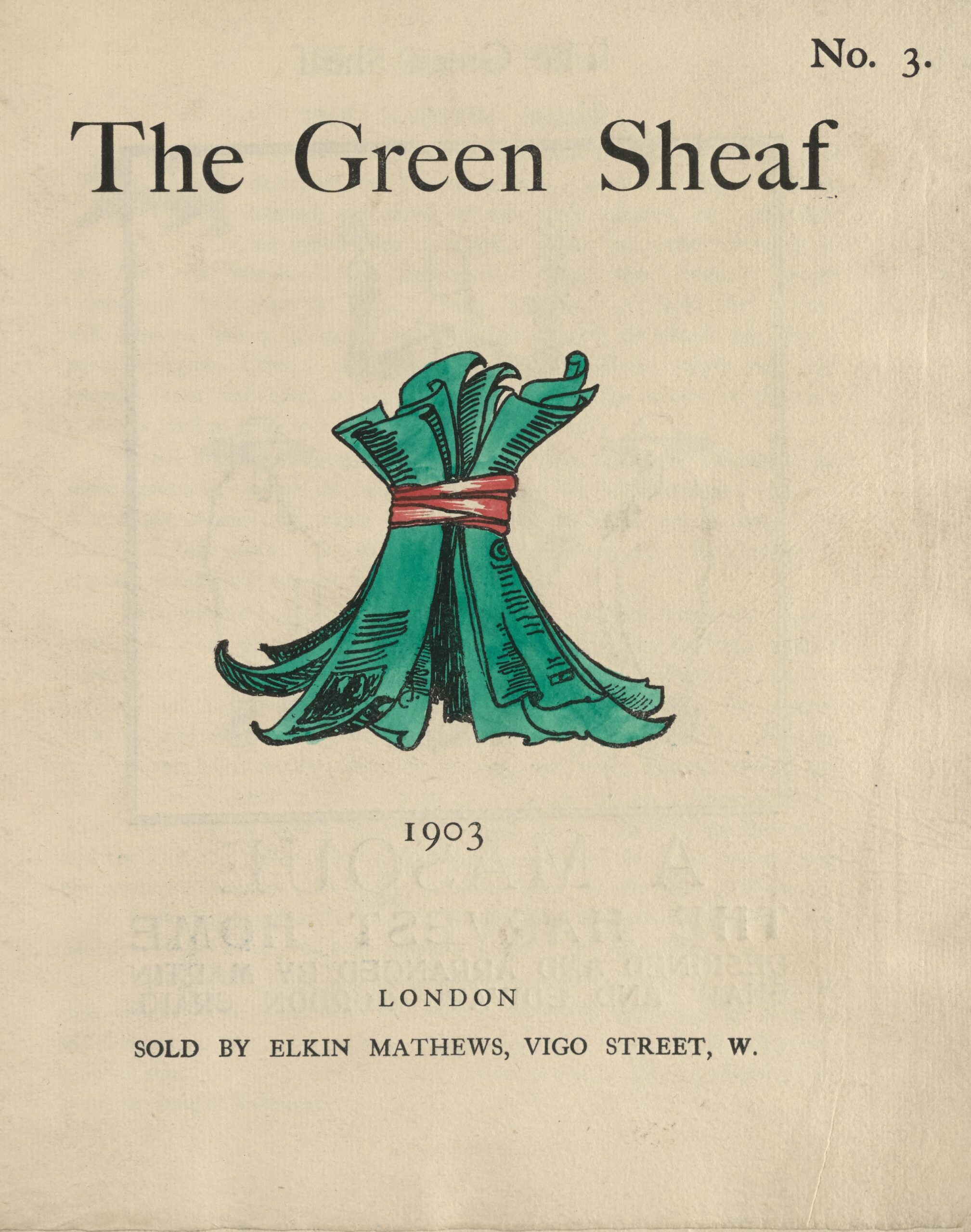
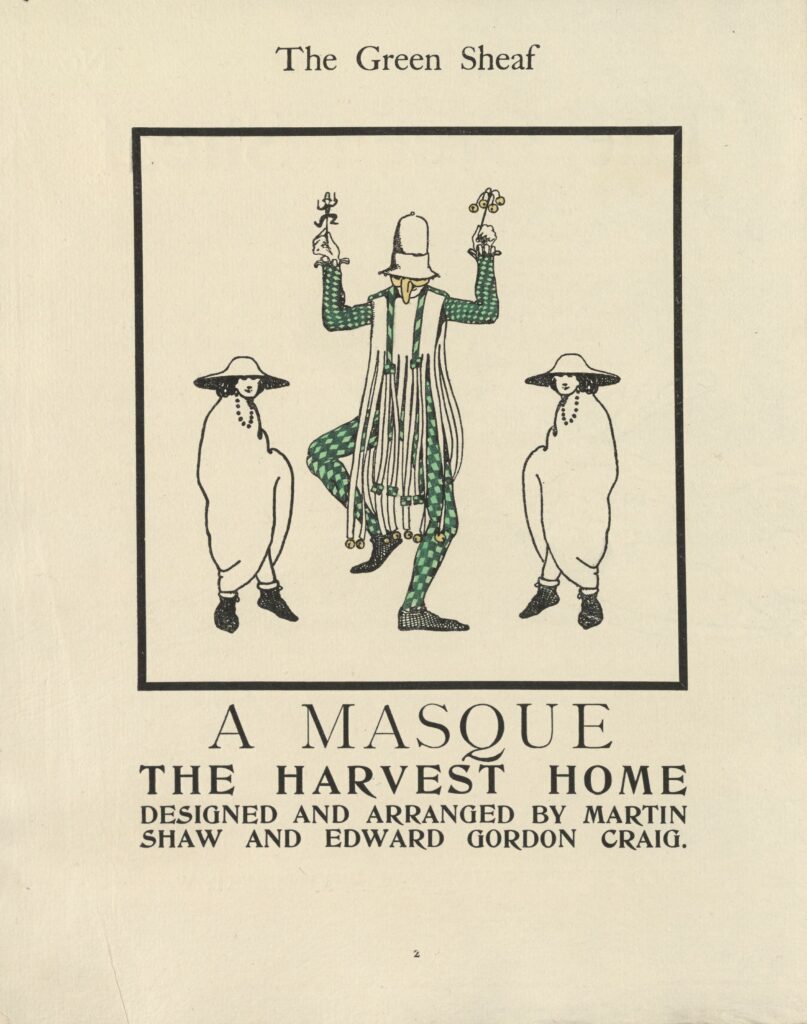
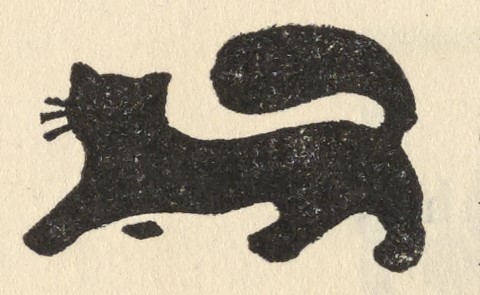
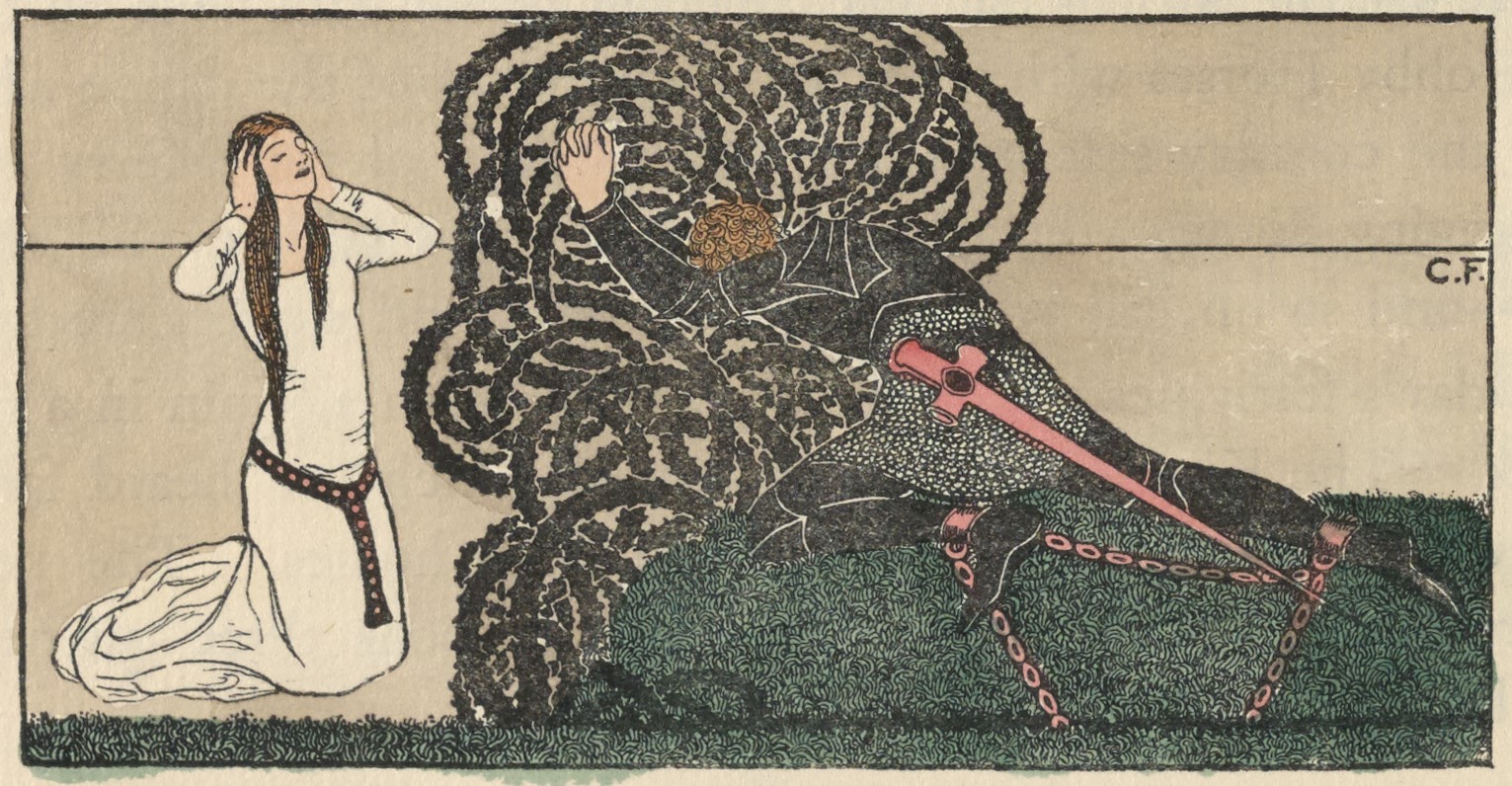
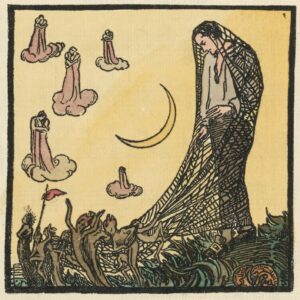
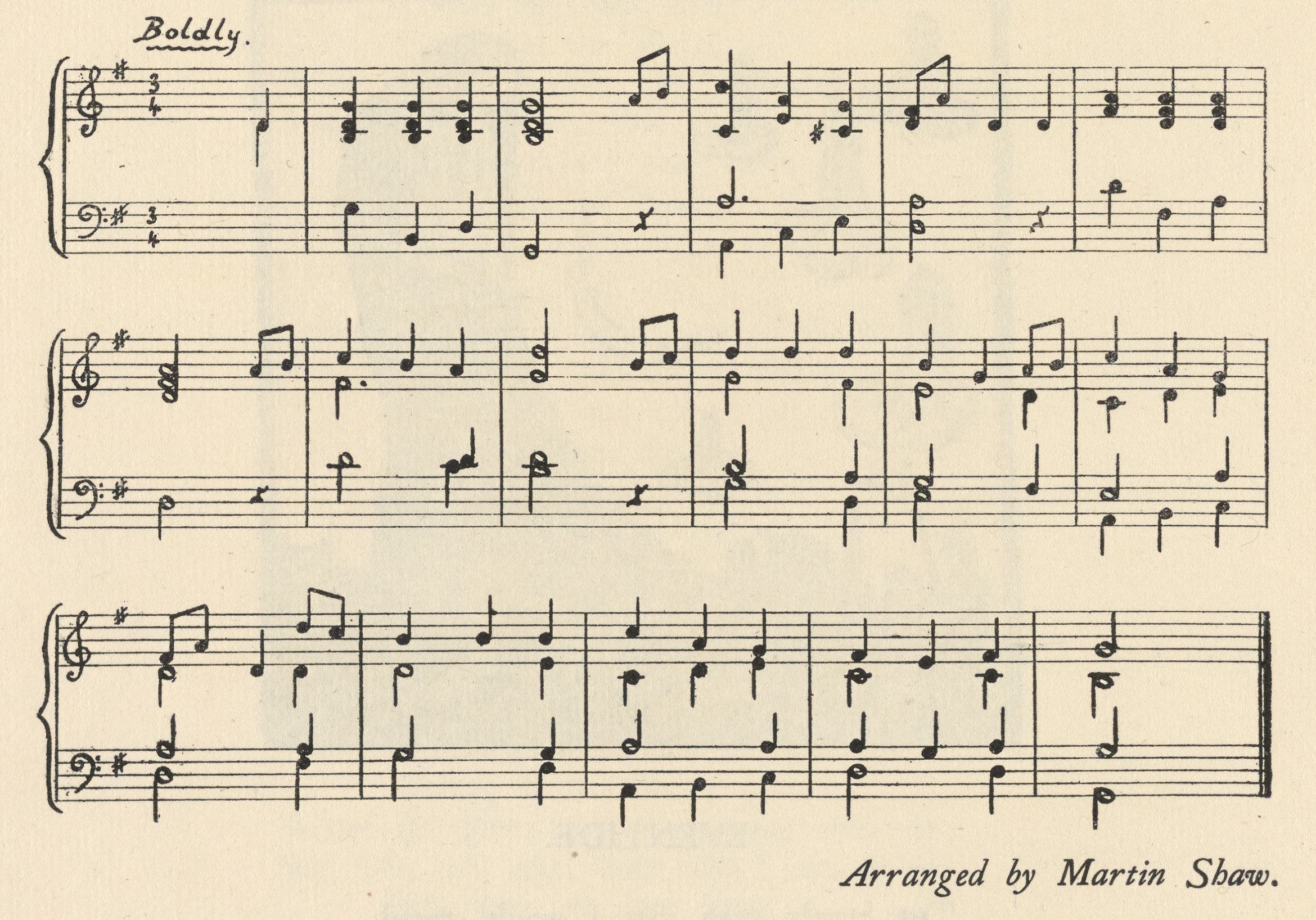


![GSV3-horton-audax This half-tone reproduction is centered on the page, outlined in a black rectangular frame, in portrait orientation. The image, rendered in black, depicts an armoured knight, facing toward the viewer. He holds a sword whose blade pierces the eye socket of a horned skull which lies at his feet. He is surrounded by black trees, branches, and brambles. The artist’s monogram, partially obscured, is in the bottom right corner. The image’s title is printed below the image: “AUDAX IN RECTO” [i.e, the Stewart Family Motto: Bold in the Right].](https://1890s.ca/wp-content/uploads/GSV3-horton-audax-scaled.jpg)
